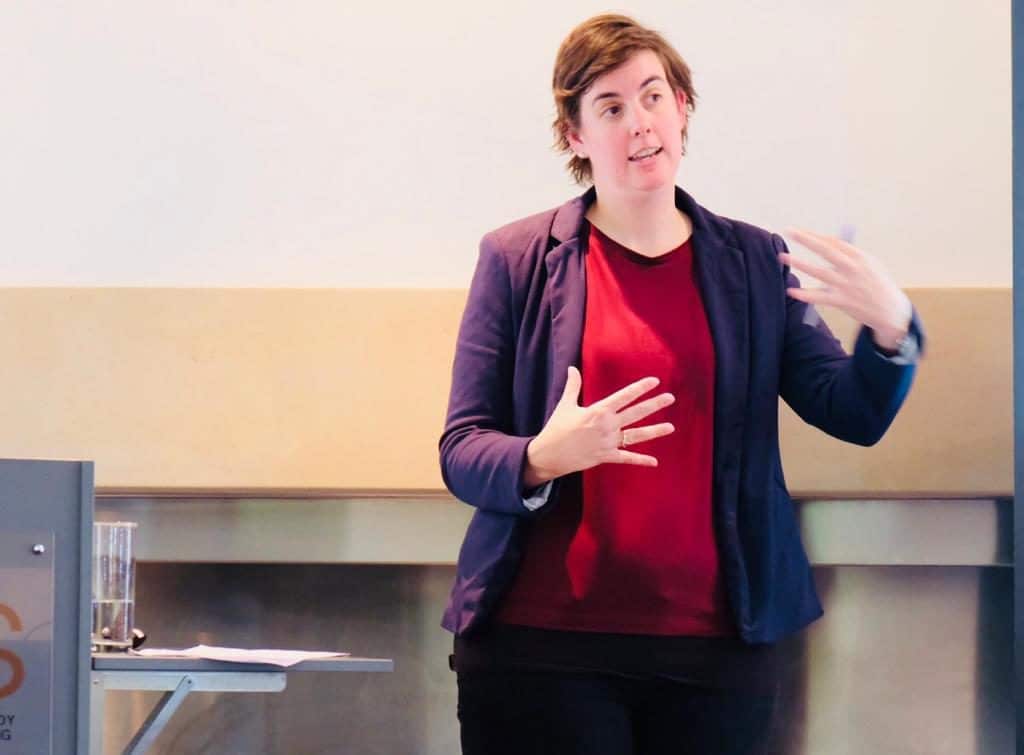“Consumer demand is a collective outcome that influences states. Citizens have a responsibility to think about how their actions interact. We have a duty to be aware that our consumer choices influence policies and the state, and ask ourselves if we can use these to leverage more justice and accountability,” said Christine Hobden of the Department of Philosophy, University of Fort Hare.

Hobden, who is a STIAS Iso Lomso fellow, explained that this focus on consumerism and the politics of consumption is part of her broader project that develops a theory of what citizenship means in a globalised world. She argues for citizenship that is state-based but globally oriented and outward looking, where citizens have a duty to act collectively to hold their state accountable to act justly on the global stage.
“I’m trying to understand the best way to live justly in a state-based world. It’s a consequentialist cosmopolitan view of citizenship.”
She sees consumerism and the politics of where and how we spend our money as an arena in which citizens can play an active role to hold the state accountable.
“Expanding beyond the traditional political sphere, I argue that the consumer sphere is a site of politics and ought to be leveraged as such. I’ll unpack different forms of political consumerism, their influence upon the state, and the potential effectiveness of political consumerism in pursuing a more just and sustainable world,” she said. “In my account of citizenship, political consumerism is not just the individual ethical choice not to use a plastic straw, but a civic responsibility to work alongside fellow citizens to collectively shift incentives for corporations and the governments that regulate them.”
Voting with our wallets
Hobden explained that consumer activism has a long history and incorporates different methods. She provided some examples ranging from specific product boycotts and buycotts; to the rating of corporations according to specific dimensions like the Oxfam Behind the Brands campaign; to #GrabYourWallet – a campaign that targets companies associated with Donald Trump; to labelling – where companies signal compliance with a cause, for example, animal anti cruelty; to the direct provision of information to consumers; and, product/company shaming via social media.
Such campaigns can be long-term or focused on a specific moment, and the issues are broad-ranging from production ethics to corporate leadership, focusing on labour rights, environmental concerns, or discrimination on the grounds of race, gender or sexual orientation, among many others.
“Product shaming via social media is working more and more,” she said. “An example is the recent Economic Freedom Front Clicks protests in South Africa which started on social media and grew to become a physical consumer protest. The EFF physically stopped people from shopping at Clicks stores, a step beyond launching a boycott campaign. It is interesting to note the success of this strategy within our democratic context – and an example of why we need to think through consumer politics and its ethics more carefully.”
“In the Oxfam campaign companies changed their policies to move up the rankings because they were worried about the bad press.”
She pointed to political consumerism as a manageable form of engagement.
“It doesn’t require a huge amount from the individual. You can boycott or buycott in your own consumer space where it’s okay to prioritise your own interests. Politics as a whole can be complex but you can buy into consumer campaigns to varying degrees and levels of tangible action.”
“Typical choices involve changing brands or food choices. This is not a big ask. However, it signals a move towards change and willingness to act as a collective.”
It’s also a space that allows for non-citizens to participate in political action and allows people to have an impact beyond their own borders in tackling other governments, large corporations and multinationals.
“We can’t be neutral in what we consume, especially collectively,” she said. “Often we try to engage in active ignorance – where you protect yourself from knowing uncomfortable things. But if we ignore, we create a permissive environment for or actively promote injustice.”
She also emphasised that it’s not a stand-alone idea or strategy, and needs to be accompanied by other forms of direct political action like voting but that it can form useful groundwork for more comprehensive collective action.
Taking politics to the market and the market to politics
Turning to whether such consumer action is in itself democratic, she said: “There is a reluctance to take politics into the market and a desire to keep dubious market values out of politics, but they are not separate, so we have to focus on how we can do politics well in the market realm”.
“We have a collective political responsibility to think about the ways our consumer choices interact and together influence the state. It’s a tool to hold the state accountable for its choices in the market as a consumer and producer, and for how it regulates markets through policies like trade agreements and wage negotiations. Corporate lobbies have a big influence on the state; political consumerism can shift incentives for these corporate lobbies, and in the long term reduce their power through diminishing their market share.”
“I believe we have to include consumerism in our thinking of what it means to be a citizen. It’s one response in many but we need to think collectively and trust that collective action works.”
She also stressed that it’s possible to start small. As an example she used Meat-Free Mondays. “This can send an important signal, it signifies the values of individuals or companies and a willingness to act.”
“We don’t need to be absolutist to start,” she said. “More demand for ethical products will help to make them more accessible for everyone.”
“I believe we have no choice: consumerism is political and key to creating a more just world. As citizens, we have a collective responsibility to act with that reality in mind.”
Michelle Galloway: Part-time media officer at STIAS
Photograph: Noloyiso Mtembu
